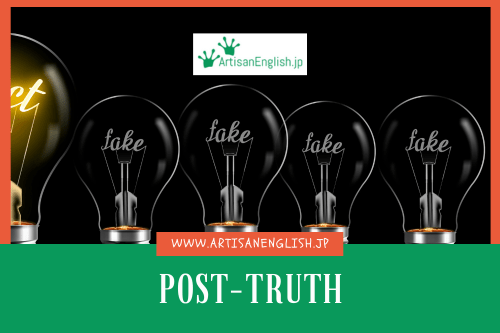
YouTube / iTunes / Spotify / Radio Public / Pocket Casts / Google Podcasts / Breaker / Overcast
Listen to ArtisanEnglish.jp posts & lesson intros here.
Word of the Day: Post-truth
Oh boy, as 2024 draws to a close, I can’t help but sigh and think, “What is the world coming to?”
Populism is on the rise, the Americans voted for Donald Trump AGAIN, the governments of both Germany and France have fallen, Korea is in a constitutional crisis because the president declared martial law only to rescind it six hours later, Ukraine is still at war, Israel is still at war, the rebels are defeating the Syrian government and advancing at lightning speed, and this was the hottest year on record.
It’s almost too much to believe, leading me to today’s term post-truth.
Post-truth refers to a situation where emotions and personal beliefs have more influence on public opinion than objective facts.
In other words, in a post-truth environment, people are more likely to believe something that aligns with their views, even if it is not true.
The rise of social media has played a significant role in the spread of post-truth ideas.
Information travels fast, and sometimes, what is shared is not verified.
This creates a challenge because, in a post-truth society, misinformation can easily overshadow facts.
For example, during elections, candidates may use post-truth tactics to sway voters, focusing on feelings rather than facts.
Remember Trump’s “They’re eating the cats; they’re eating the dogs; they’re eating the pets of the people that live there!”
Recognizing this concept helps us navigate the information we consume daily.
It encourages us to evaluate sources and be aware of our biases critically.
Post-truths can affect public trust and make reaching a consensus on important issues impossible.
Another example of post-truth can be seen in discussions about climate change.
Despite overwhelming scientific evidence, some people deny facts because they feel uncomfortable with the implications.
To combat post-truth, we must strive for media literacy.
Learning how to question sources and seek truth is vital.
Discussions where facts are prioritized over emotions can also help reduce post-truth influences.
We are all going to hell in a handbasket, and it’s already burning.
Flesch-Kincaid Readability Test
This post is understandable by someone with at least a 9th-grade education (age 15).
On the Flesch-Kincaid reading-ease test, this post scores 54.
The easier a passage is to read, the higher the score on a scale of 0 – 100.

